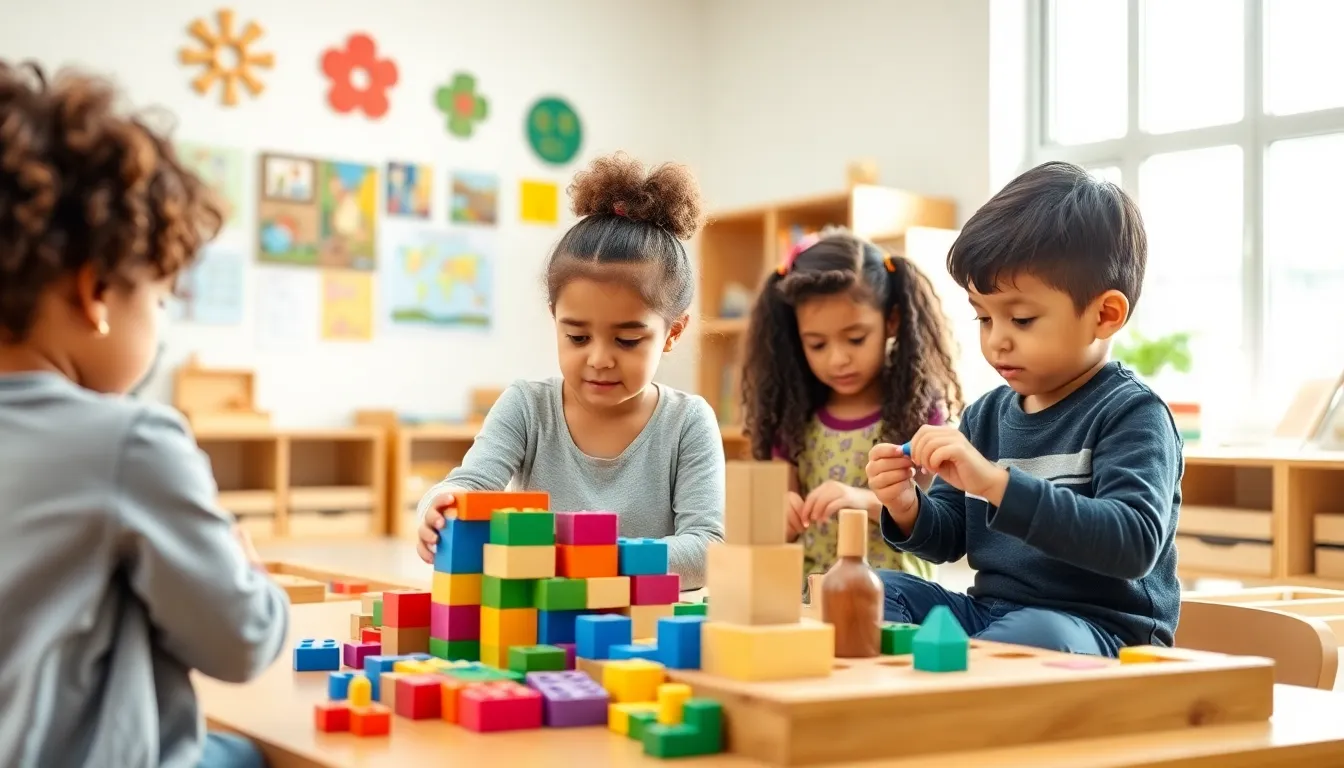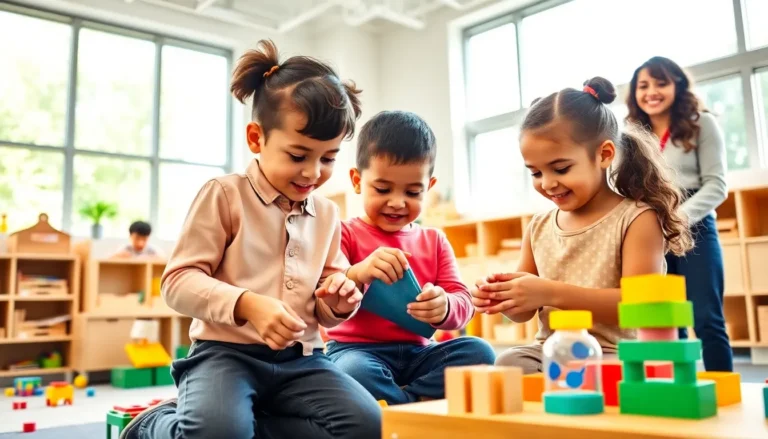Montessori training isn’t just about teaching kids; it’s about unleashing their inner geniuses while keeping the chaos to a minimum. Imagine a classroom where children aren’t just sitting quietly, but actively exploring, discovering, and learning at their own pace. Sounds like a dream, right? Well, it’s a reality in Montessori environments, where the philosophy encourages independence and curiosity.
Table of Contents
ToggleOverview of Montessori Training
Montessori training emphasizes child-centered learning that nurtures independence and curiosity. This approach involves teachers guiding rather than directing children, allowing them to explore freely and develop critical thinking skills. Children engage with hands-on materials that support various learning areas, including language, mathematics, and sensory experiences.
School environments designed with Montessori principles foster collaboration and respect among students. Classrooms often contain mixed-age groups, encouraging peer learning and social development. Teachers observe and assess each child’s unique needs, tailoring their support to enhance individual growth.
Training programs for educators typically cover Montessori philosophy, child development, and specific teaching strategies. Participants learn to create stimulating environments that invite exploration and discovery. Accredited training centers, such as the American Montessori Society, offer certificates and diplomas to ensure quality education for educators.
In corporate settings, Montessori principles apply to employee training, promoting autonomy and collaboration among teams. Companies adopting these practices often report increased innovation and employee satisfaction.
Additionally, parents can adopt Montessori principles at home, facilitating a supportive environment that aligns with these educational values. Providing children with age-appropriate tasks and materials fosters self-sufficiency and confidence.
Implementing the Montessori approach requires a commitment to ongoing learning and adaptation. Growing evidence supports its effectiveness in various settings, affirming its relevance in contemporary education.
Key Principles of Montessori Training

Montessori training relies on several key principles that shape its educational philosophy. These principles create an environment fostering independence, curiosity, and active learning.
Child-Centered Learning
Child-centered learning forms the backbone of Montessori training. Educators act as guides, allowing children to explore subjects like language and mathematics at their own pace. Each child’s unique interests and developmental stages direct the learning process. This approach promotes natural curiosity, resulting in deeper engagement with materials. Observation plays a crucial role, with teachers assessing progress and adapting activities to suit individual needs.
Hands-On Activities
Hands-on activities constitute another essential element of Montessori training. Children learn through tangible experiences, interacting with specially designed materials that promote understanding. Such activities enhance cognitive skills while encouraging exploration. For example, tactile learning aids in grasping abstract concepts, making them more relatable. Engaging in these experiences cultivates problem-solving abilities, fostering independence in learning.
Mixed-Age Classrooms
Mixed-age classrooms illustrate the collaborative spirit of Montessori training. Grouping children of various ages fosters peer learning and mentorship. Older students often take on leadership roles, reinforcing their knowledge while assisting younger peers. This dynamic creates a supportive community where cooperation thrives. Children develop social skills and empathy, enhancing their emotional intelligence while learning from each other’s strengths.
Benefits of Montessori Training
Montessori training offers numerous advantages that promote holistic development in children.
Enhanced Independence
Children cultivate independence through hands-on experiences and self-directed learning. In a Montessori environment, they choose activities aligned with their interests and abilities. This freedom fosters confidence, encouraging him or her to take initiative. By making choices, they develop decision-making skills that contribute to personal growth. The structured yet flexible setting allows each child to progress at their own pace, reinforcing their ability to work autonomously. Ultimately, such independence lends itself to lifelong learning.
Social Development
Social skills flourish in Montessori classrooms where mixed-age groups encourage collaboration. Older peers often mentor younger students, creating a supportive community dynamic. Every interaction promotes empathy as children learn to respect differing perspectives. Conflict resolution becomes a vital skill through guided discussions and cooperative play. These experiences enhance communication abilities, fostering a sense of belonging. Furthermore, a strong foundation in social skills prepares children for future teamwork both in education and career settings.
Academic Success
Montessori training lays a solid groundwork for academic achievement across subjects. Engaging with tactile materials deepens understanding of complex concepts, such as mathematics and language. By nurturing a natural curiosity, children become self-motivated learners who seek knowledge beyond the classroom. This approach fosters critical thinking and problem-solving skills that serve students throughout their educational journey. Enhanced focus and concentration lead to better retention of information. Academic success in Montessori settings often translates into higher performance in traditional educational contexts.
Challenges in Implementing Montessori Training
Implementing Montessori training presents several challenges that educators need to navigate effectively.
Teacher Training Requirements
Teacher training poses a significant barrier to adopting Montessori practices. Specialized knowledge about child development and learning styles is essential. Understanding the intricacies of hands-on learning materials and individualized instruction also plays a vital role. Training programs emphasize observational skills, allowing teachers to tailor learning experiences based on each child’s progress. Many educators require additional resources for professional development to meet these training needs. Limited access to quality training can restrict the effectiveness of Montessori implementation.
Parental Involvement
Parental involvement significantly influences the success of Montessori training. Educating parents about Montessori principles ensures they support their children’s learning at home. Communicating the importance of fostering independence and curiosity becomes crucial. Parents may struggle to adapt their expectations based on traditional education models, which can hinder their engagement. Additionally, ongoing collaboration between parents and educators enriches the learning experience. Workshops and informational sessions help bridge this gap, fostering a strong partnership essential for reinforcing Montessori methods at home.
Montessori training offers a transformative approach to education that nurtures independence and curiosity in children. By prioritizing hands-on learning and fostering a collaborative environment, it prepares students for success both academically and socially. The emphasis on individualized learning allows each child to thrive at their own pace while developing critical thinking and problem-solving skills.
Despite challenges in implementation, such as the need for specialized teacher training and parental involvement, the benefits of this method are undeniable. As more educators and parents recognize the value of Montessori principles, its impact continues to grow across various settings, shaping the future of education. Embracing this approach can lead to empowered learners ready to tackle the complexities of the world.




